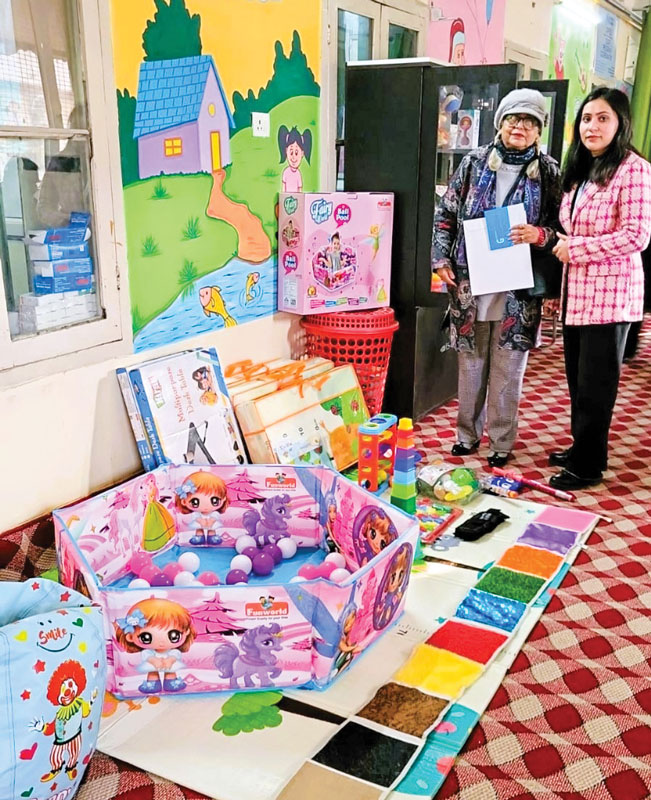When the Department of Paediatrics, in partnership with the NGO Children in India, recently started an Autism Clinic at the government SMGS Hospital in Jammu to offer a range of services to children with autism and their families, the Rotary Club of Jammu Stars, RI District 3070, happily pitched in with some colourful, modern play equipment that was required for training and therapy for these children.

This NGO works for the welfare and development of children with physical and mental challenges. Vidushi Sharma, state programme coordinator of the organisation, says that as in many parts of India, in Jammu and Kashmir too, schools for ordinary children are wary of giving admission to autistic and other children with learning and physical disabilities. “Ours is a private transformational organisation that is involved in working with children who are born with defects or have development delays. Our main objective is to mainstream these children into ‘normal’ schools.”
Quizzed on how receptive the schools in J&K are to taking in special children, she shakes her head and says, “They are absolutely not willing to take such students. But we are working towards a scenario where the mainstream education environment in the state will be much more inclusive and gives every child a chance to attend school and get qualification and knowledge.”
Special schools do exist for such children, “but we don’t recommend special schools for children with autism and other learning problems because it is in the best interest of such children to go to normal schools which are inclusive.”
That is why, she adds, Children in India decided to open such a clinic at the hospital. On why choose a hospital for such a project, Vidushi quickly says, “Oh no, autism is not a disease, but it can be managed much better and the child can be much more easily and completely integrated into mainstream education through early intervention and such support.”
The Rotarians got excited when they were told that no such autism clinic exists in the entire J&K state and willingly donated play equipment costing over ₹35,000, said club president Pooja Malhotra. “We Rotarians know the importance of community collaboration in driving positive change, and what better project could give us the opportunity to do so than one for children. Our club members were happy to support this clinic and reaffirmed their commitment to supporting initiatives that promote inclusivity and well-being in any sphere.”
Vidushi adds that right now she has approached the Rotarians only for the play equipment. “Our services at the moment include early intervention programmes, behavioural therapies, speech and language therapy, occupational therapy and counselling. The clinic’s comprehensive approach aims to provide the necessary support for individuals with autism to thrive.”

The main problem, Vidushi says, is early detection and speedy intervention. But in J&K too, as elsewhere in the country, parents are in a denial mode and refuse to admit that the delay of milestones as the child is growing up is an indication of some deficiency or difference. “If there is any instance of speech delay in a child, it’s a red flag for autism. The same is true with behavioural issues, such as the child not making proper eye contact, not playing with other children, etc. But in so many cases, the parents don’t seek help, saying no, no, my child is totally fine. They are hesitant to bring such children forward fearing what would others say… unfortunately there are stereotypes like somebody saying the child has become mentally disturbed. So we have formed parents’ groups to deal with such issues.”

But the good news is that in this newly opened clinic, already 60 children have been brought in. And now they will be put through special activities; “to handle such children, we require an occupational therapist, speech therapist and psychologist. Though available they come only once or twice a week. We also need more play equipment for enhanced activities for children so that their energy can be better channelised. We seek Rotary’s further support for all this,” Vidushi adds.
She was grateful to Dr Dara Singh, medical superintendent of the hospital, for extending total support to set up this clinic “and ensure that all individuals with autism receive the specialised care they require.”
Children in India has already signed an MoU with two other states — Nagaland and Uttarakhand — to start similar autism clinics. She says that their sister organisation Contact Cure India, which works with children having a club foot, has Rotary as their biggest donor, and Inner Wheel also supports it.






